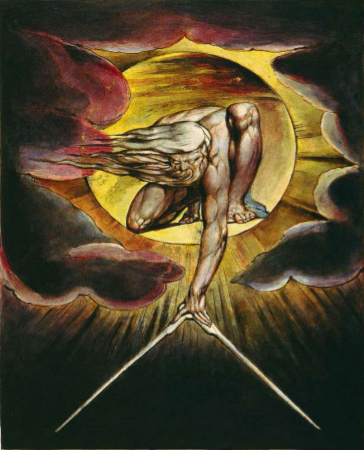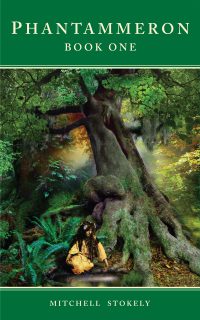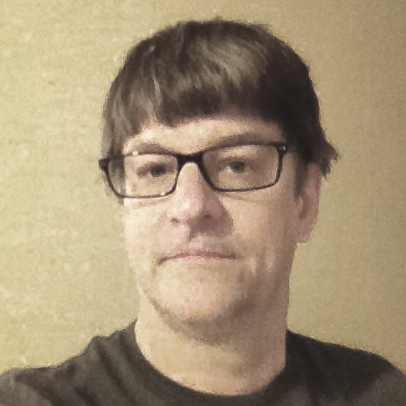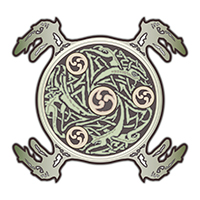The Phantammeron Novels follows the tradition of mythopoeia set down by J.R.R. Tolkien when his son Christopher finally compiled the Silmarillion in 1977. In that single work, Tolkien finally revealed his original intentions; that of using fiction to express a deeper, internal spiritual framework for his religious beliefs through story telling.
When I started my Phantammeron fantasy novel series in 1989 I set down my intentions to use my stories to do the same, expanding on what Tolkien intended to express in his partially completed religious views found in the Silmarillion. There are hints at some odd Eastern Religious views inserted into his books. For example: The determinism of Illuvitar in setting his children the Ainur to sing a vision of the world that in the end it seems Illuvitar had already heard is very much an Eastern religious idea. Tolkien’s creation myth in the Silmarillion is not based on people choosing their fate via freewill, which is a Christian view. He suggests the destiny of the world was known by him and set in motion by him, including Melkor’s evil. That is a very Eastern Religious concept.
In the first chapter of the first book (Phantammeron Book One) I lay out the creation of the world as a rebirth of a previous fallen world, which patterns the eastern and older pre-Christian Celtic view of Eternal Recurrence or “cycling” of life, of Gods, and energy forever and ever. But in conveying the remaking of my Phantammeron world I describe the Essence Eternal, or Great Father, as primarily a creative force, or being made of the Spirit Divine whose form houses the Creative Flame and Sacred Waters that inside him make him whole and take form. Such was my concept of Christian grace yet of my belief like many other deviant Christian men of the God in Man.
This then was designed to support my view that in this world God is but Creative Energy emboldened through the living, this artistic creative power being his primary purpose in remaking the world and giving it life. This “divine creative concept” forms the basis for my general view of God and what he means to me in my own faith; a creative force that fills us all and drives to be like Him, creators of beauty, and yet in us lives, too.

This matches the views of many writers from the Enlightenment period of the late 1700’s; artists like William Blake who saw creativity as a vital part of Mankind’s natural law and being. Like him, through this belief, I cultivated a higher view of creative people as they are closest to God, being above the rich, the political, and even religious people. People who are artists, writers, and musicians thus become for me the most divine people in our society. For the divine is strongest in them.
But the Creator in my book suggests something more….something beyond my Christian views of God. In Chapter One of Phantammeron Book One I say the following:
“The Essence Eternal awoke from sleep. For he heard voices echoing up from the depths of that which he had made. They were the lonely cries of his children, calling up from the dark waters that lay hidden within the heart of the world.
Reaching out, he held their tiny lights in his hands and breathed into them the fire of his own spirit. They were now cast from the Spirit Divine, of which he too was made, taking form and shape as sons born unto him. Yet were they also of him, as his divine immanence, through them, took form incarnate. So would he, forever after, remain whole and inseparable in all his children.
Through their various forms and works would they be known to each other, while through their spirits would they be known to him alone.”
When the Divinity in my novel wills his first sons to life I say he “breathed” life into them. This mythological idea comes from Native America Myth. The idea that a child is “cast” from the Creator is also very Native American or Mayan-inspired, where in story the first animals were made from clay or molded by the creators hands. This again was my expression of and respect for Native American mythology and cosmology. And so I am combining myths and spirit like Tolkien and Blake from many sources.
But the most import concept expressed in the last two sentences of the passage above I’m most proud of. I reworked it many times and it is the direct result of something completely intuitive that eventually poured out of me onto the page. As such I consider it “religiously inspired” piece of text you might say, as it was very unconscious when it finally came to me. Yet it has stirred in me questions from evolving ideas about God I still cannot fully answer. Nor had the Bible addressed these questions or concepts for me. And that is the concept O mentioned earlier of the Divine God living in us.
In the passage I say that the Great Father’s sons were “born unto him” yet “of him”. That is a very profound spiritual idea which is somewhat Christian as it references the Holy Ghost and a very dualistic idea that Jesus was both the Son of God and yet God the Father. That concept today is generally accepted by most Protestant churches as a profound ecclesiastical concept with additional meaning and purpose. But it is also a Celtic/European concept as well, as the Celts in England and Ireland often held conflicting views on many religious concepts. Often in Celtic Fairy Tale you have things existing in two worlds at once. There’s a famous ancient Welsh druidic poem about a tree seen in a vision as half alive, half on fire. That patterns this view of Jesus the Messiah being both son and father God.
In the Phantammeron what I saw was this idea that in fact the Creator placed himself in his children, but only pieces of himself. So the idea was as his children came together they would make him and therefore themselves whole. This then forms the basis for men and women, too. For bonds of love forming a uniting of two things made whole and divine stands strong in my books. And so when this concept of the divine in Man came to me it made me realize there was more meaning there than I first thought. It was a divine meaning spiritually summoned up into me.
All life in the book would itself now became God-like and spiritual based on that view. It told me something more about my internal spiritual self….that all life is truly divine and maybe my Christianity had left something out I had discovered and felt intuitively about the Universe. And that was why I have chosen to push the idea of Fiction Writers writing myth and not personal needs into their stories and characters. All of writing like any creative endeavour is a profound religious experience if we but will it.
There is something powerful and religious about writing Mythopoeia. But there remains one last fascinating idea I wanted to share from that first chapter with you. In the last sentence in the passage from the Phantammeron I mention the fact that the Essence Eternal, the Creator, placed himself in his children. I then say they would know each other by their “forms and works” but only He alone would know then by their spirits.
This idea seemed most remarkable to me at the time as it poured itself onto the page; the idea that God put himself in us divided so we could bear witness to each of his wonders through others. Is that not how we see Humanity and ourselves? Do we not know each other by our gifts, our love, our divine presence? It makes sense if we are part of our Creator but we each bear a unique part of him that must be honored. And so all life must be honored and cherished as divine, but love of another living being its highest expression of unification with God.
But this idea shows we only see pieces of the divine whole. But God knows us by our spirit as part of his wholeness. That then explains the meaning of why we are here and why we are all separate people, with beauty, value, and gifts designed to be loved and recognized by us all.
This idea came so naturally to me in my first chapters of the book, but it also hit me as something quite profound and meaningful in my life. It has opened up this concept that continues today of some “divine glamour” placed on our eyes intentionally so that we only see each other and all life as but pieces of God, and that God made our limited vision so we could recognize those gifts and not be blinded to its majesty. We must now view each other as divine parts of his majestic whole. That;s what the passage from my book now implies to me, in both the fantasy world I created and yet strangely in this world, too.
But saying a divine Creator would know alone our spirits means we cannot and should never know of that vision, as to know it means we cannot see the gifts in each other. Its intentional blindness to spirit. Maybe it also means he cannot see or experience what we see, which is the short but passionate that is life. But if our God is in us his spirit surely must see both. And so such a simple passage now derives powerful spiritual revelation to me of the “essence” of a Creator both in my work and yet in life.
And so like the passage states in my first chapter, some divine energy or Creator in my books and in this world has allowed me to both write this story and yet discover something spiritual from it in order to assist in the Divine Joy of his Creation!
I’m sharing my life and art with others as you share your own life with others through creating. But its all done by God. Its a self-affirming thing, you see? And that is one important concept about my work I wanted to reveal tonight, as in later books with more characters and creatures coming into my stories, that central religious concept will grow and expand to explain many mysteries in future books.
– Mitchell Stokely, the Author, June 13th, 2018



